Disinformation about ‘antifa’ provides fodder for foreign propagandists
Iranian opposition and Turkish pro-government trolls
Disinformation about ‘antifa’ provides fodder for foreign propagandists
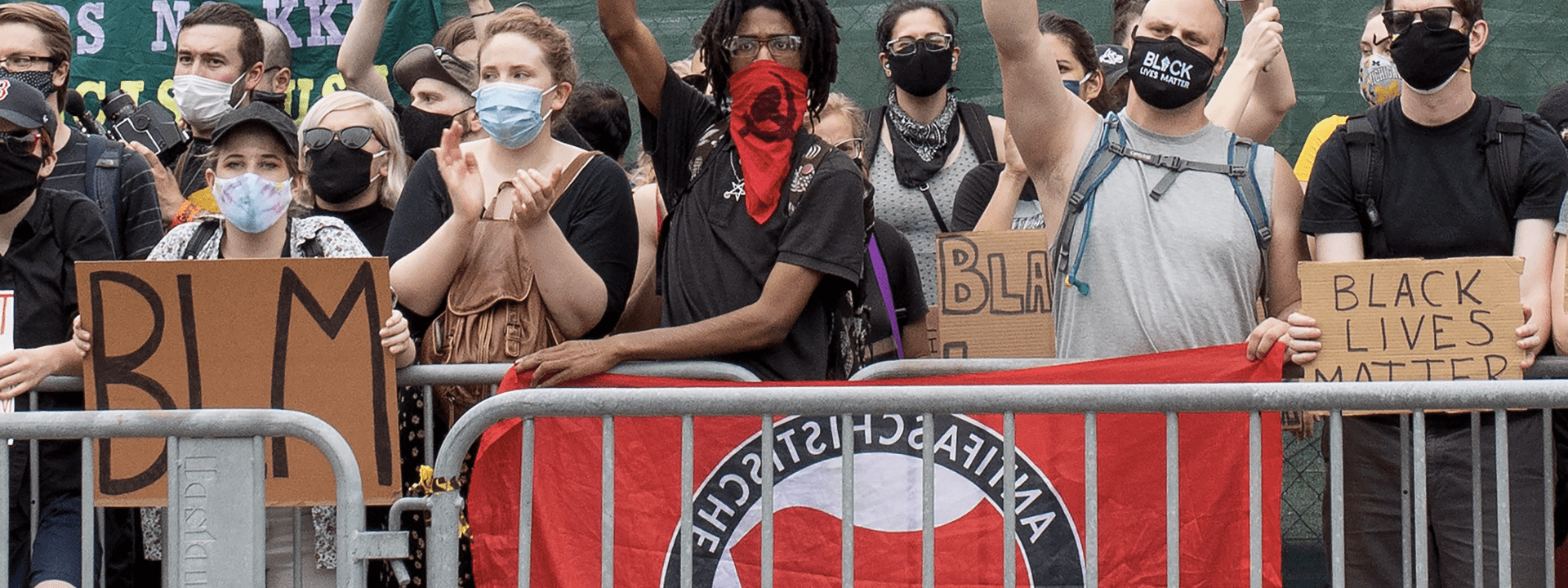
Iranian opposition and Turkish pro-government trolls echo U.S. far-right talking points about George Floyd protests
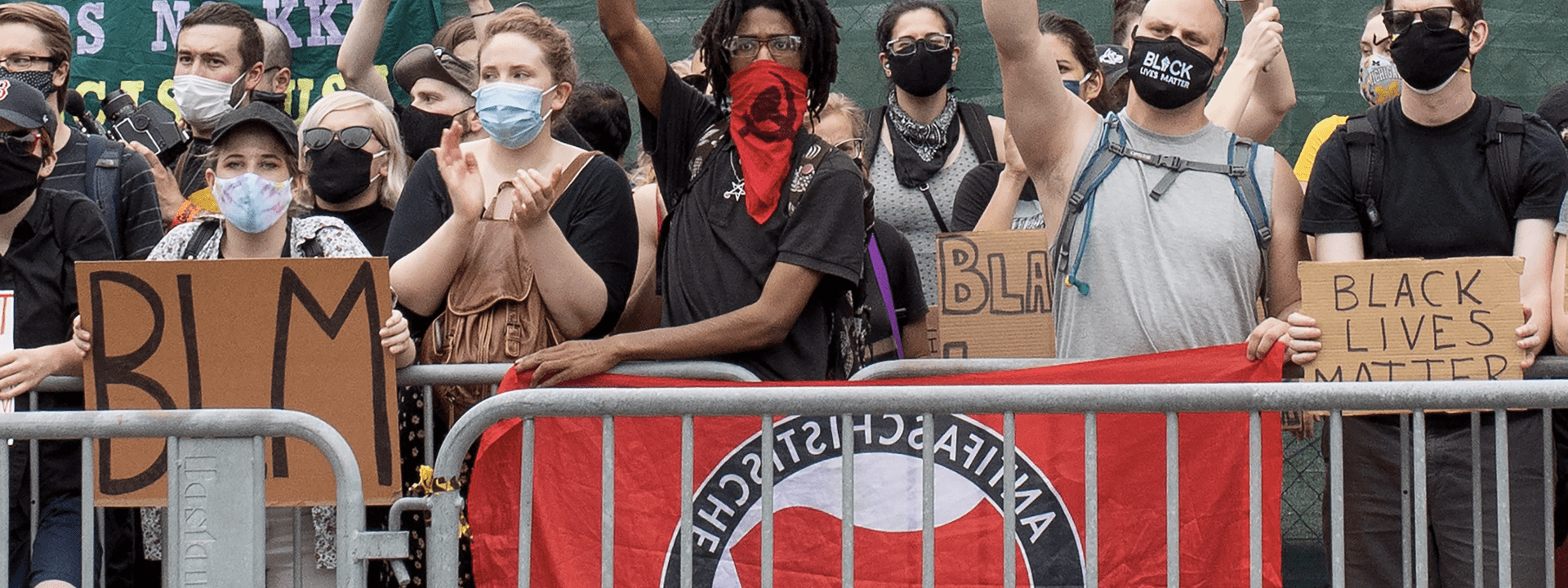
Shortly after the start of the George Floyd protests, U.S. domestic actors engaged in a disinformation campaign to delegitimize the demonstrations. This campaign sought to link “antifa” direct action groups with domestic terrorism and to erase any distinction between antifa and the broader movement against police violence and systemic racism. Now, international propagandists have begun to repurpose this narrative toward their own ends.
Extremists within the Iranian opposition have used false antifa narratives to lobby for American military action against Iran, alleging that violent U.S. protesters are funded by “Radical Democrats” and the Iranian government. Meanwhile, Turkish state media and pro-government trolls have used it to advocate for the U.S. designation of the Kurdish People’s Protection Units (YPG) as terrorists, emphasizing tenuous ties between the YPG and antifa activists in the United States. Both the Iranian and Turkish networks have directed pleading and obsequious messages toward President Trump, seeking to reach him via his Twitter feed.
These foreign influence efforts illustrate the pathways by which foreign actors seek to placate Trump administration officials and affect U.S. government policy. They also show the speed and scale at which U.S. domestic disinformation can become a global topic of conversation, used opportunistically by anyone with English-language proficiency and an internet connection.
Extremists in Iranian opposition use antifa to lobby for overthrow of Iranian government
A fringe Iranian opposition movement named Restart has capitalized on these narratives to falsely link antifa to Iran, U.S. Democrats, China, former U.S. President Barack Obama, and his former Vice President, Joe Biden. Proponents of Restart advocate for President Donald Trump’s reelection and seek to “Make Iran Great Again” by overthrowing the current Iranian government, possibly through the U.S. military intervention that they have repeatedly asked for, and installing a government based on Cyrus I’s 6th century BCE political charter and the U.S. Constitution.
Restart appears to have started antifa rumors the same day that President Trump labeled antifa a terrorist organization. Restart’s Persian-language site published an article on the topic on May 31, 2020, according to the article’s source page, stating that antifa “is affiliated with the #Obama team and an organization under the auspices of the Radical Democrats, a #terrorist group.” That same day, one of Restart’s several English-language websites published an article claiming that antifa is “backed by the terrorist regime of Iran, The Communist Party of China (CPC), the Radical Democrats and of course the Obama team.”
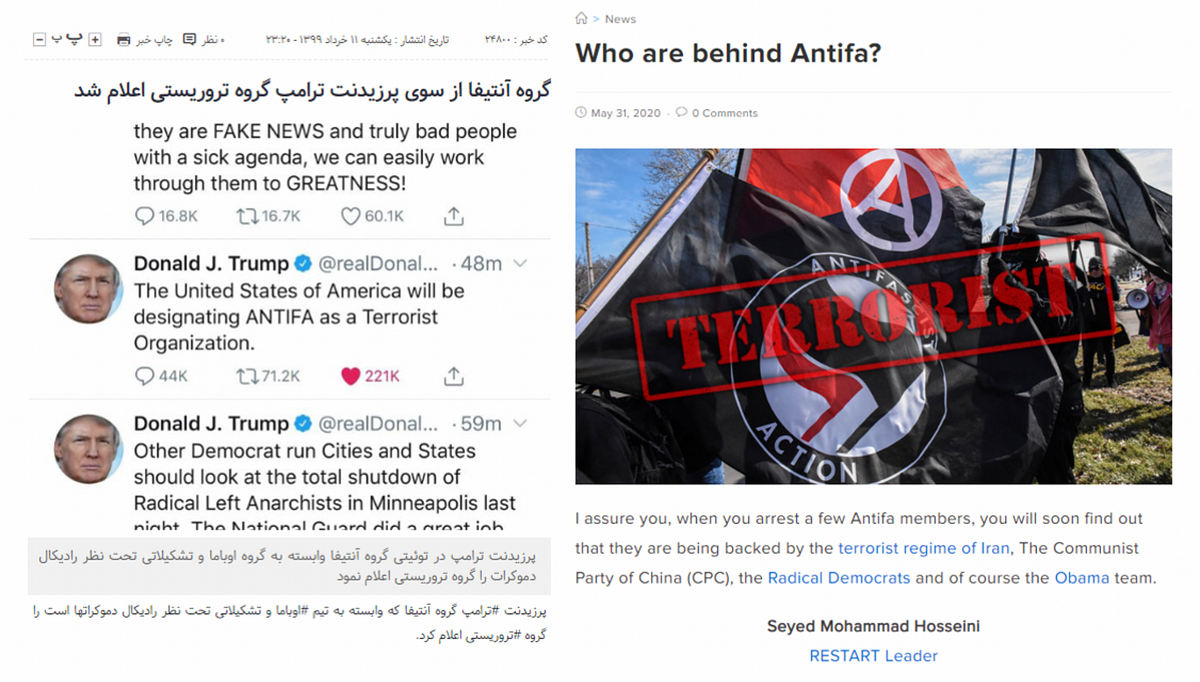
In conjunction, @restartleader, the hub of the Restart movement on Twitter, posted the same message on Twitter, where it garnered 1,300 retweets and was re-posted verbatim by a popular Qanon account, @QPatriot17. From May 31 to June 10, this message was copy and pasted verbatim in tweets 54 times by 17 unique accounts, often in reply to @realDonaldTrump and other figures, according to a query using social media listening tool Meltwater Explore.
Restart continued to post content furthering antifa narratives, including a Persian-language article about antifa beating up an innocent woman and Joe Biden’s presidential election campaign supposedly supporting antifa violence; a bilingual Twitter video with a blurred-out face stating that antifa was funded by the Iranian government and run by Democrats in order to disintegrate the U.S., and an English-language article about how “radical Democrats” created antifa in order to foment a U.S. civil war.
Notably, the Restart movement teamed up with members of the Qanon community for an apparent Twitter brigading campaign on June 10, 2020, advertised on prominent Qanon and Restart Twitter accounts. The campaign — which instigators described as a Twitter “storm” — sought to characterize Trump and Restart movement leader Seyed Mohammad Hosseini as Macedonian King Alexander II and Persian king Cyrus I, respectively. It is unclear if their choices were a mistake, though, as Alexander II and Cyrus I are less well-known than their more successful namesakes Alexander III (Alexander the Great) and Cyrus II (Cyrus the Great).

A Telegram post viewed 19,400 times in a Restart channel listed #Antifa, #AntifaTerrorists, and #AntifaDomesticTerrorist as three of the hashtags to post during the campaign. While the brigading seemed designed to garner mainstream attention — posters stated it would occur from 12:30 p.m. until 3:30 p.m. ET — it seems to have been unsuccessful. All three of the antifa-related hashtags referenced on Telegram peaked far earlier on the day Trump designated antifa a terrorist organization, thus missing the designated window, and even some of the more obscure hashtags, such as #Iranians_Hate_PMOI_RezaPahlavi (in reference to rival opposition group MEK and the former crown prince of Iran), did not peak in use during this time either.
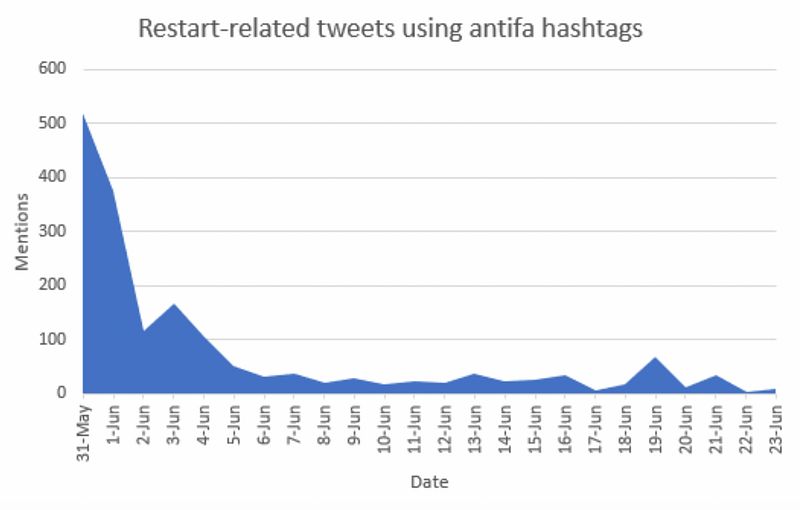
Seventy-seven percent (1,781 of 2,320) of the tweets that used the three antifa hashtags were Restart-related from May 31 to June 23, according to the social media listening tool Meltwater Explore. Restart’s message — characterizing antifa as terrorists linked to Iran, Democrats, Obama, Biden, and China while simultaneously glorifying Trump as a savior — appeared to have been designed to appeal to the Trump administration in order to achieve Restart’s objective of Iranian regime change.
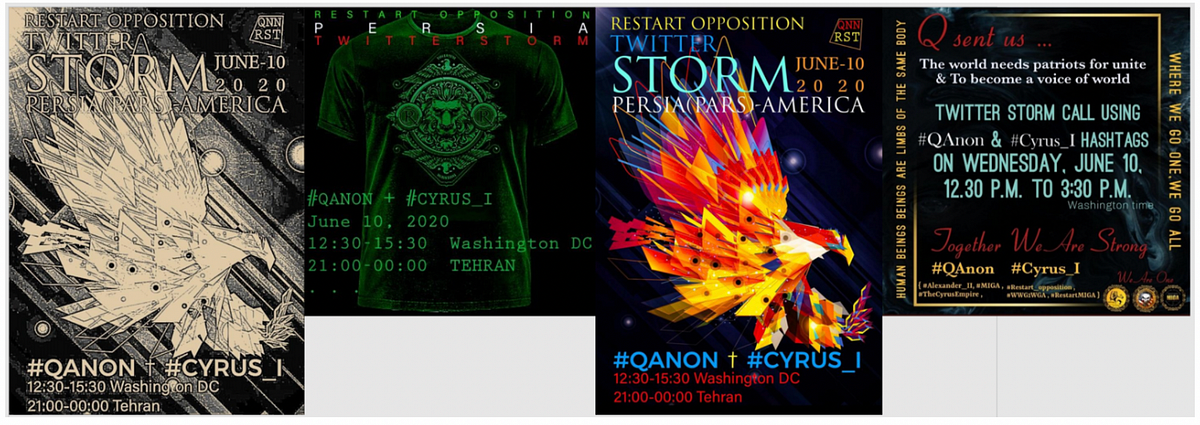
Turkish state accounts link antifa to Kurdish groups
Pro-government Turkish Twitter accounts also characterized antifa as terrorists responsible for instigating violent riots in the United States and began a dedicated campaign to link the movement to Kurdish groups.
Like the effort by the Iranian Restart movement, the pro-Turkish campaign coincided with Trump’s announcement that the United States would designate antifa a “terrorist organization.”
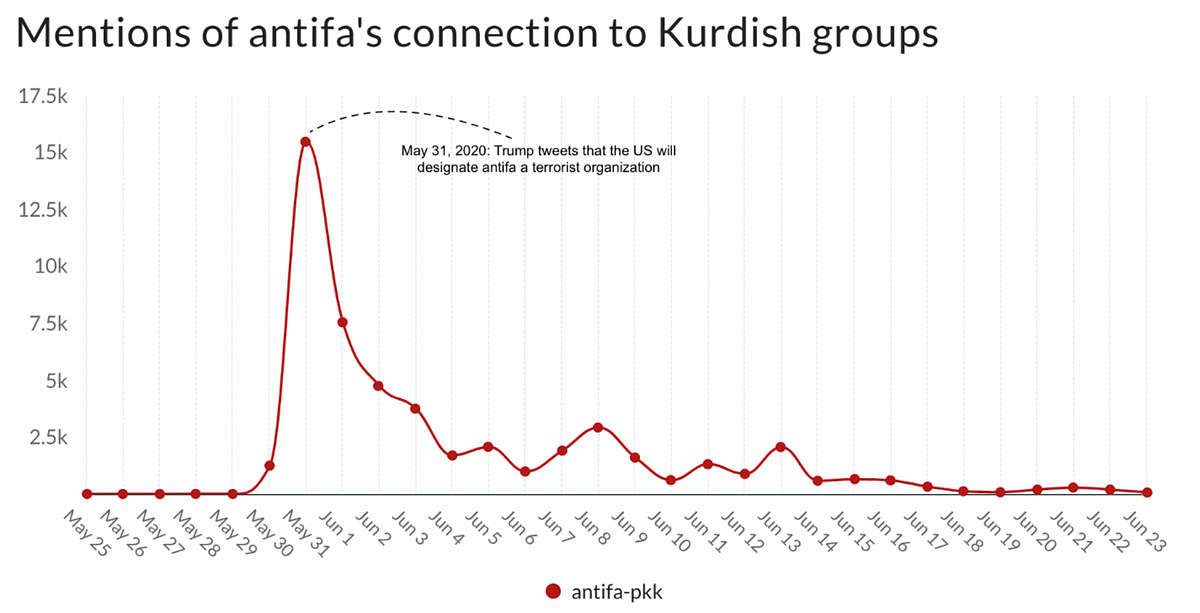
Official Turkish state Twitter accounts, including that of the Turkish Directorate of Communications and its director, Fahrettin Altun, tweeted out professionally produced videos and infographics that blamed antifa for instigating violence at the protests in the United States and further connected the loosely connected anti-fascist movement to Kurdish groups operating in Turkey and Syria.
https://twitter.com/Communications/status/1268233544066883585/photo/1
We saw the true face of ANTIFA, which carries out violent attacks around the world in cooperation with terrorist groups, in Syria.
Let us get to know ANTIFA, which has been involved in violent protests across the United States, a little better: pic.twitter.com/76tZhtLOUC
— Fahrettin Altun (@fahrettinaltun) June 6, 2020
The claims that Kurdish groups trained antifa in Syria and that the two groups work in concert together to carry out “violent attacks around the world” are false. It is well documented that some leftist Westerners traveled to Syria to fight alongside the YPG — the Kurdish militia aligned with the U.S. military at the time — against the Islamic State. But the extent of both the ideological affinity and a formalized relationship between antifa and Kurdish groups in Syria and Turkey has been widely exaggerated in Turkish state propaganda.
Furthermore, the insistence that YPG-trained antifa “terrorists” are fomenting violence amid the protests in the United States builds on and complements an existing U.S. domestic far-right disinformation narrative: that the protests are driven by “antifa terrorists.” In this case, far-right conspiracy theorists in the United States latched onto the Turkish state propaganda connecting the U.S. protests, antifa, and the YPG in Syria. On June 8, far-right conspiracy theorist Jack Posobiec tweeted out the video from Turkey’s Comms Directorate.
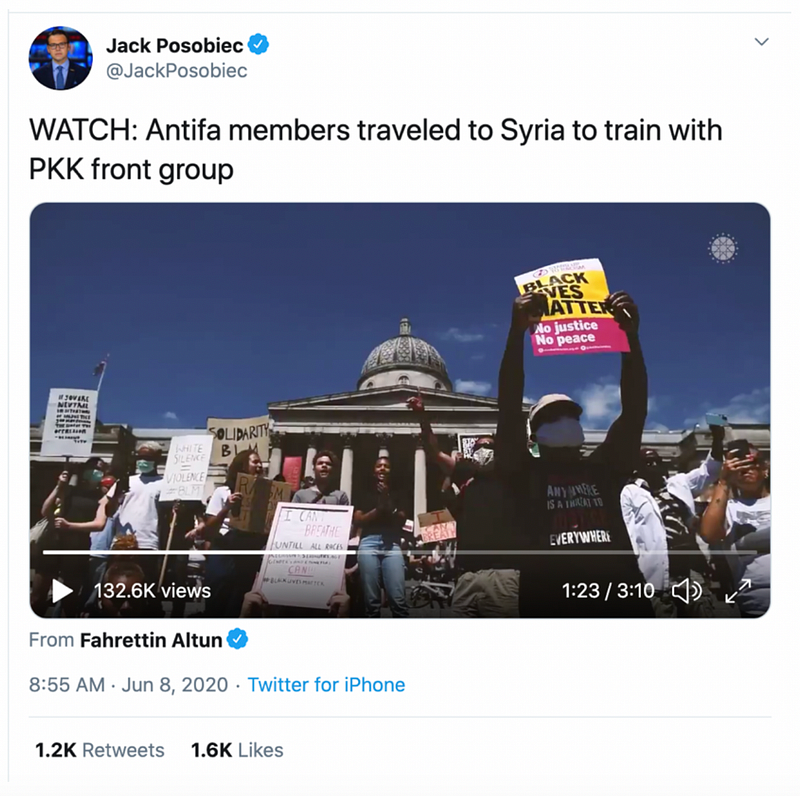
Turkish President Recep Tayyip Erdoğan appears to be exploiting the U.S. far right disinformation narrative about antifa, which President Trump has also promoted, to convince Trump to designate the YPG as a terror organization by proxy. Turkish state-run outlet Anadolu Agency reported that, in a June 8 phone call, President Erdoğan told Trump that those behind the “riots” in the United States (i.e., antifa) are working with “terrorist group YPG/PKK.” Turkey argues that the PKK in Turkey and the YPG in Syria are one and the same; the United States distinguishes between them, designating the former a “foreign terrorist organization” but not the latter.
The PKK and the YPG share a political and intellectual lineage rooted in the teachings of Abdullah Ocalan, the leftist political theorist and founder of the PKK who is currently imprisoned in Turkey. Aliza Marcus, a journalist and researcher who was among one of the first Western reporters to study the PKK based on accounts from within the group rather than relying on statements from the Turkish government or PKK militants in Turkish custody, has previously said that the YPG and its political counterpart in Syria, the PYD, were founded by the PKK over a decade ago to focus on the situation of Syrian Kurds in Syria — in contrast to the PKK, which has been focused on waging a decades-long insurgency against Turkey.
Turkish government rhetoric, however, has exaggerated the extent of ongoing organizational coordination between the YPG in Syria and the PKK in Turkey, and failed to acknowledge that the PKK in Turkey and the Syrian Kurds each operate according to their own distinct motivations, interests, and within diverging regional contexts.
This disinformation narrative is a recurring one, and pro-Turkish government actors have previously employed it to justify and further Turkey’s objectives in the region. In October 2019, after the Trump administration ordered the withdrawal of U.S. troops from northeastern Syria, Turkey began a cross-border military offensive against Syrian Kurdish forces that U.S. troops had been fighting alongside against ISIS. Alongside that military operation, termed “Operation Peace Spring” by the Turkish government, Turkish pro-government accounts waged a parallel information campaign using astroturfing techniques dedicated to demonizing Syrian Kurdish forces and supporting the Turkish government’s offensive. This disinformation campaign equated the YPG in Syria with the PKK in Turkey under the hashtag “#BabyKillerPKK,” casting both Kurdish entities as terrorist groups that regularly kill innocent civilians, including children.
In the current case, the Turkish state narrative linking antifa to the Kurds was designed to advance a specific Turkish foreign policy goal: convince the United States to declare the YPG a terrorist organization. But the narrative ended up resonating in unexpected places, as accounts in Japan and South America began applying it to local contexts.
A network map showed prominent clusters of accounts tweeting in Japanese, as well as Portuguese and Spanish.
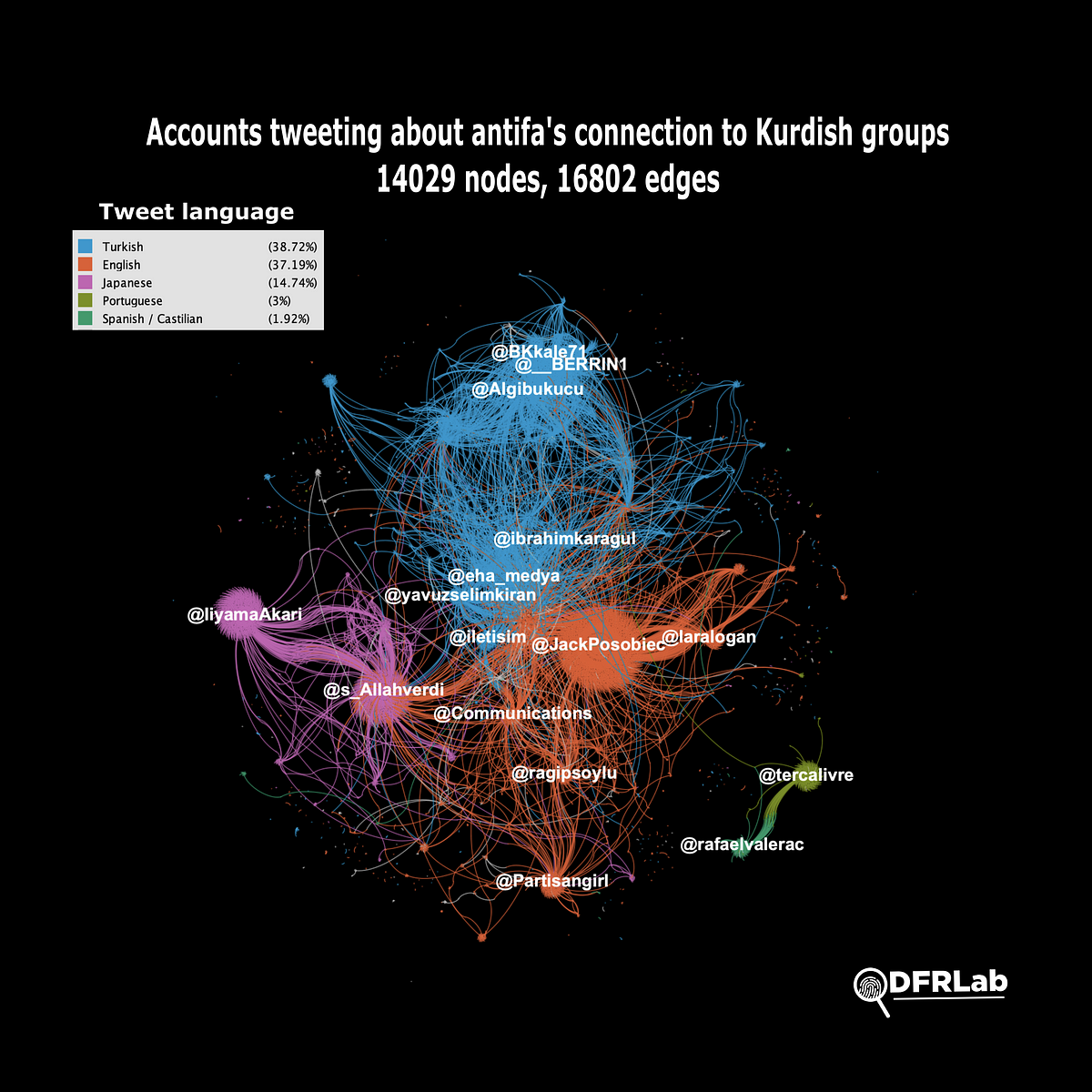
In Japan, an instance of police brutality against a Kurdish man in Tokyo has become a rallying cry for the #BLMTokyoMarch. Japanese-language accounts that tweeted about the connection between antifa and Kurdish groups primarily echoed and retweeted Turkish pro-government accounts alleging a connection between antifa and the YPG. Some also implied that antifa was associated with the main opposition party in Japan, the Constitutional Democratic Party (CDP).
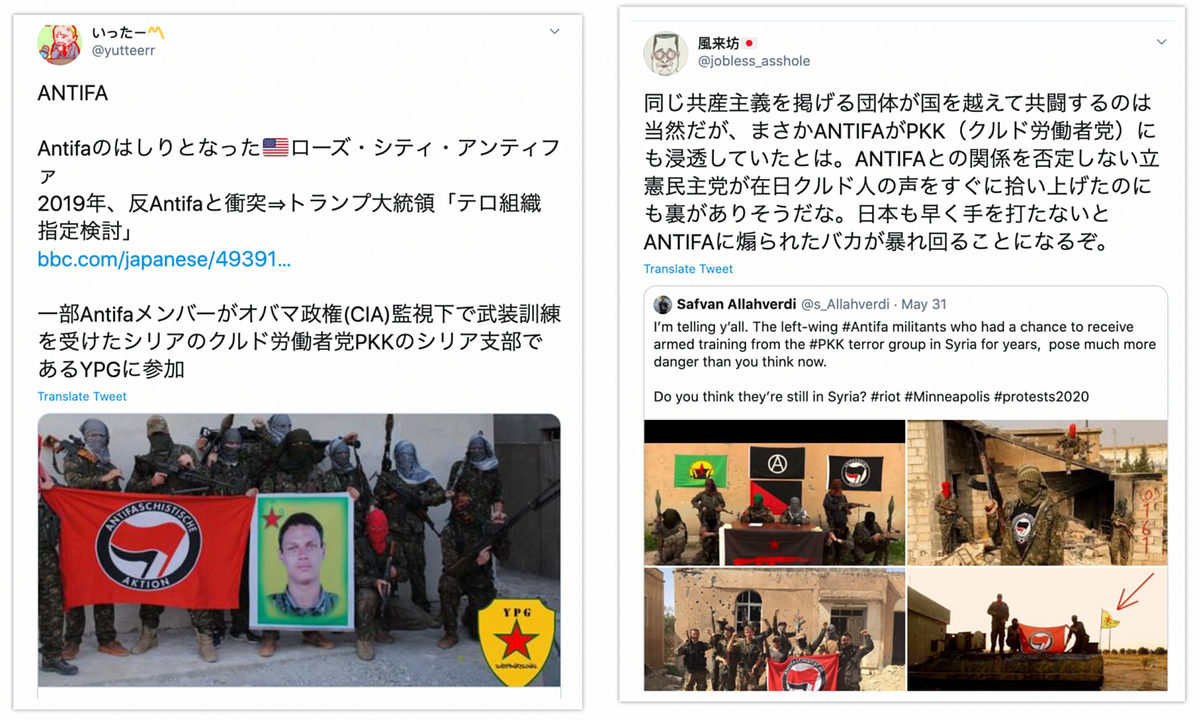
An isolated cluster of accounts centered around far-right influencers and outlets tweeting in Spanish and Portuguese also accused antifa of receiving training from the “Kurdish terrorist PKK” in Syria. In one of these tweet, @traffiCARACAS, an account with over a million followers that typically tweets updates on traffic conditions in Caracas, compared Kurdish groups’ supposed training of antifa with Cuba’s training of 70’s guerilla groups: “The American antifa group received training from the Kurdish terrorist organization YGP/PKK in Syria,” the account wrote. “They have expanded to Latin America, just like in the 70’s guerilla groups would receive training in Cuba.”
In all of these cases, the disinformation was overt and opportunistic and did not appear to be aimed at sowing division, but instead at supporting geopolitical and domestic political agendas.
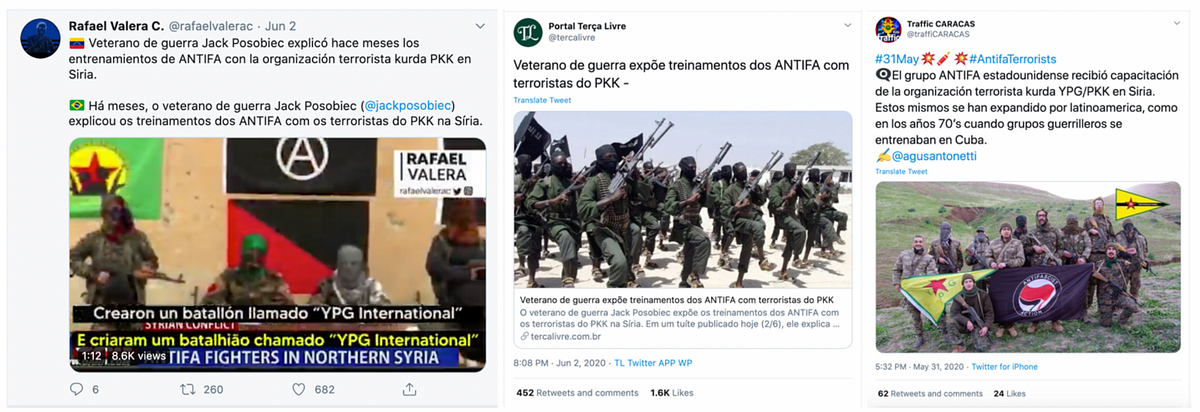
Soon after antifa-related disinformation swept the far-right U.S. media ecosystem, it was harnessed by foreign propagandists. For the Iranian Restart movement and Turkish government proxies, this has meant pushing the idea of “antifa” as a coherent, globally based terrorist organization. The intent is to affect major changes in U.S. foreign policy by echoing the language of conservative U.S. pundits and explicitly targeting the president of the United States.
This should be of special concern to U.S. officials and lawmakers. By design, these lobbying efforts skip all existing layers of the U.S. bureaucracy and all applicable oversight mechanisms. When President Trump has shared his views publicly — as with his declaring antifa a “domestic terrorist organization” — Iranian and Turkish pressure campaigns have adapted, seamlessly incorporating new domestic U.S. narratives into their own propaganda.
The result is a compelling, adaptable messaging strategy. Theoretically, this propaganda has been delivered straight to the president’s smartphone.
Emerson T. Brooking is a Resident Fellow with the Digital Forensic Research Lab.
Alyssa Kann is a Research Assistant, North America with @DFRLab.
Zarine Kharazian is Assistant Editor with @DFRLab.
Follow along for more in-depth analysis from our #DigitalSherlocks.

